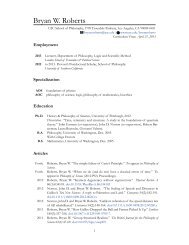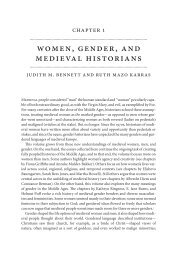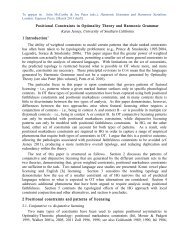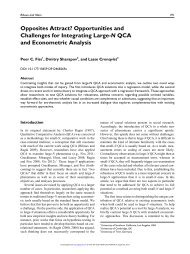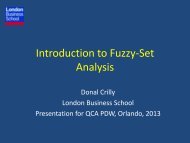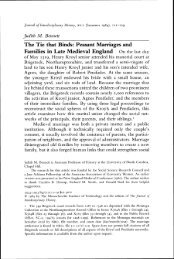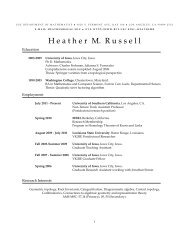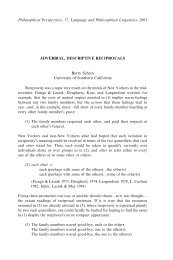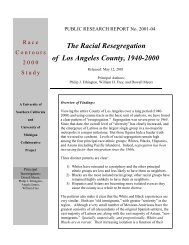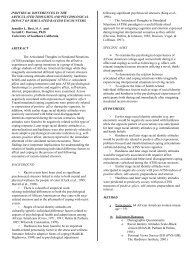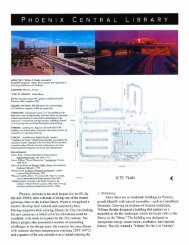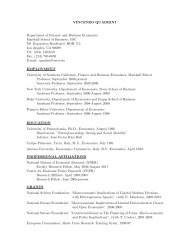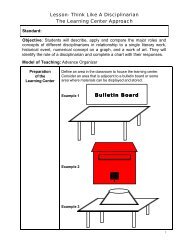Shieva Kleinschmidt [This version differs from the Phil Studies ... - Usc
Shieva Kleinschmidt [This version differs from the Phil Studies ... - Usc
Shieva Kleinschmidt [This version differs from the Phil Studies ... - Usc
You also want an ePaper? Increase the reach of your titles
YUMPU automatically turns print PDFs into web optimized ePapers that Google loves.
occupy <strong>the</strong> same region, but it would not be problematic for two portions of stuff to do<br />
so? 12<br />
I will not argue for <strong>the</strong> stuff-<strong>the</strong>orist’s view about what’s required for colocation<br />
to be problematic; because endorsing it is part of <strong>the</strong> stuff-response to <strong>the</strong> problem of<br />
colocation, I will take it as a starting point and work <strong>from</strong> <strong>the</strong>re.<br />
Endorsing this view of when colocation is problematic, along with <strong>the</strong> stuff-<br />
<strong>the</strong>orist’s picture of which kinds of ordinary entities are portions of stuff, is sufficient to<br />
deal with cases like that involving <strong>the</strong> statue and lump above. However, <strong>the</strong> solution will<br />
be utterly unhelpful if it gives rise to its own problematic colocation cases.<br />
3. Puzzling Cases<br />
The Water Case: Suppose a puddle exactly occupies region r, and is constituted by a<br />
portion of water, also exactly occupying r. The portion of water is constituted by H2O<br />
molecules (hydrogen and oxygen atoms which bear specific relations to one ano<strong>the</strong>r) <strong>the</strong><br />
sum of which exactly occupies r. The atoms are each constituted by portions of stuff as<br />
well. We don’t want to say <strong>the</strong> atoms are constituted by water, because <strong>the</strong> atoms are just<br />
too small for that. So we have some non-water stuff that constitutes each atom. <strong>This</strong><br />
means that, for every region where <strong>the</strong> water is located (every region occupied by a<br />
hydrogen or oxygen atom which stands in <strong>the</strong> proper relations to o<strong>the</strong>r atoms), <strong>the</strong>re is a<br />
portion of atom-constituting stuff that is distinct <strong>from</strong> <strong>the</strong> water.<br />
So far, <strong>the</strong>re is nothing problematic about this case. However, Tyler Burge points<br />
out that common mass nouns have <strong>the</strong> unique feature that any sum of portions of <strong>the</strong><br />
referent of <strong>the</strong> noun can be referred to with <strong>the</strong> same noun. That is, <strong>the</strong> following<br />
statement will be true for any (common) mass noun K: Any sum of portions of K is a<br />
portion of K. 13 In our water case, <strong>the</strong>re is a sum of <strong>the</strong> portions of atom-constituting stuff<br />
which constitute <strong>the</strong> atoms in r. Therefore, <strong>the</strong>re is a portion of atom-constituting stuff<br />
12 Conceivably, this is defensible; <strong>the</strong> denial of <strong>the</strong> underlying general principle, that it is problematic<br />
whenever more than one material entity exactly occupies a certain region, is entailed, for instance, by <strong>the</strong><br />
claim that events are material (due to having spatial location) and can be colocated. Once this claim (or<br />
one relevantly similar to it) is defended, <strong>the</strong> proponent of this response would need to show that portions of<br />
stuff are like <strong>the</strong>se colocatable entities ra<strong>the</strong>r than like things in <strong>the</strong> relevant respect. I, however, do not see<br />
that second step as very promising.<br />
13 Burge, “Truth and Mass Terms,” pp. 264 and 275. I will take it as understood that I am quantifying only<br />
over those stuff-kinds that are widely recognised (though perhaps not qua stuff), such as water, wood,<br />
energy, matter, etc.



